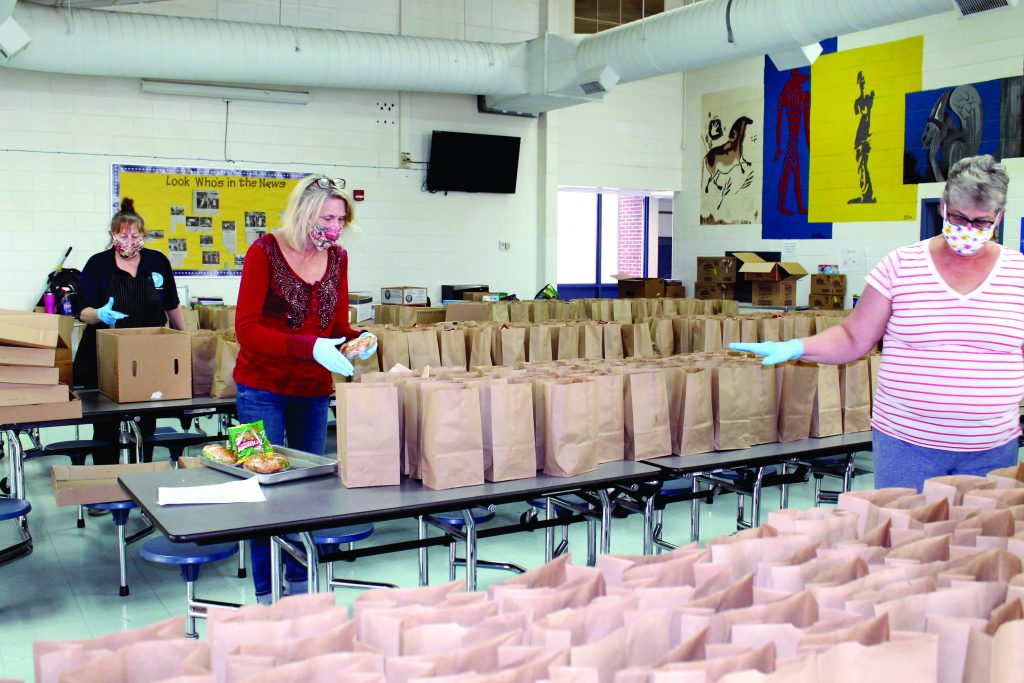Feeding students who aren’t in school has been a challenge for Mathews County Public Schools, but division Cafeteria Manager Nelda Gibbs and her team are proving to be up to the job.
Using a combination of site pick-up for students who can make it to school and home delivery for those who can’t, Gibbs and a gang of employees and volunteers are providing 275 students with two meals a day Monday through Thursday, while 375 students receive them on Fridays. The operation is flowing smoothly these days, but Gibbs said that wasn’t always the case.
“The first three weeks I had never been so overwhelmed in my life,” said Gibbs. “I felt like it was bigger than me. I worked through 9-11, Isabel, and lots of storms, but none compared to COVID-19. None have been bigger than this.”
Like all good teams, Gibbs and her people figured out how to proceed, and on a recent Thursday morning, the operation was running like clockwork. While staff in the kitchen at Mathews High School were preparing a hot lunch for senior citizens receiving Meals on Wheels—which the school system provides on a contract basis for Bay Aging—Gibbs and other cafeteria workers were in the cafeteria filling individual bags with a breakfast of mini pancakes, syrup, a box of cereal fruit and milk. For lunch, bags were packed with pre-packaged, individually-wrapped turkey and cheese croissants, chips, fresh apple slices, animal crackers and fruit snacks.
Two days a week, students receive a hot sandwich for lunch, and the other items change, as well, with different sandwich meats and perhaps fresh vegetables and ranch dressing. Breakfast could include a bacon, egg and cheese or sausage biscuit. Milk is a part of every meal.
Every Friday, in addition to the two meals provided the rest of the week, the team packs an extra bag of food for the weekend, said Gibbs. This might include an individual pack of microwaveable macaroni and cheese or ravioli. The bag will also include a fruit, apple juice, and perhaps pop tarts or some other food that can be easily prepared. This is the continuation of the Snack Pack program that is provided year-round by local churches.
Gibbs said that when schools first closed due to the coronavirus pandemic, she and her team were preparing 67 meals for Lee-Jackson Elementary School students and 55 for those at Thomas Hunter Middle School. But the meals are intended for any child in Mathews, whether a student in the school system or not, and the children’s families don’t have to qualify for free or reduced meals. So when delivery drivers arrived at homes and found “two or three children under five,” they took note, and those children were included the next time, as well.
“When we started to include all children, the numbers got high,” said Gibbs.
In addition to food, Gibbs said the team is now accessing shelf-stable foods, toiletries and other items that are donated by local organizations and kept in the nurse’s closet at Mathews High School for students in need who don’t receive the snack packs, and those items are delivered, too, as needed.
“When this hit, high school students had no access to anything,” she said. “With the help of the guidance office and teachers, we have included high school kids also in the delivery.”
Gibbs said that she can’t provide meals for children without a parent’s permission, so any family in need should make a request.
The program is very costly, said Gibbs. While food served in the cafeteria is purchased in large containers at bid prices, the food that’s sent home must be individually prepackaged. Not only that, but those types of food can be hard to find, so she might have to buy a more expensive brand. Some days, she said, she has to go to Sam’s Club or Food Lion to fill in what’s missing.
In addition, when children buy food in the cafeteria, they pay a portion of the cost, while the home-delivered meals are provided entirely free of charge. The number of children served on a regular, in-school day is 650 to 700, said Gibbs, but between the amount the children pay and federal reimbursement, the budget was easier to manage. She said she’s not sure how much federal funding schools will receive for the home meals program.
“Right now, we’re feeding kids,” she said. “We’ve got the logistics worked out, and I don’t lie awake in bed anymore.”
Gibbs said that she and her staff are taking all the recommended precautions to limit the chance of the spread of COVID-19. They wear masks and gloves, practice social distancing, and clean every surface multiple times a day. “The kitchen is probably cleaner than ever,” she said.
Still, if an employee feels uncomfortable or doesn’t feel they can work, it’s okay. By the same token, if they travel or go out of town, they have to stay home for two weeks. Gibbs and Diane Bing are the only ones working every day, but, she said, “I wouldn’t be anywhere else. I love what I do.”

